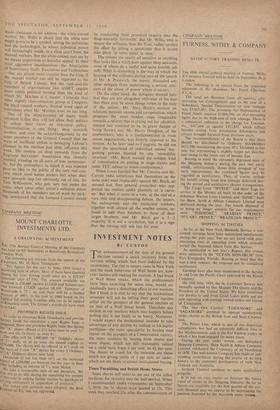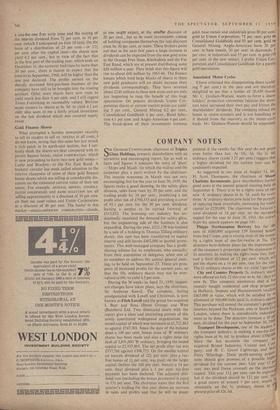INVESTMENT NOTES
By CUSTOS
THE announcement of the date of the general election caused a quick recovery from the nervous selling which had been induced by the uncertainty. The rise in money rates in New York and the weak behaviour of Wall Street are, how- ever, factors still making for caution. A bad break in Wall Street stocks, which the professionals have been expecting for some time, would un- doubtedly have a disturbing effect in our markets. But I think it is true to say that the institutional investors will not be selling their good equities either on the prospect of the general election or on that of a Wall Street break. Therefore any decline in our markets which may happen before polling day is not likely to be heavy. Moreover, I would expect the institutional investor to take advantage of any decline by adding to his equity portfolios—the more speculative by buying steel shares on the prospect of a Conservative victory. the more cautious by buying bank shares and store shares, which are still reasonably valued on a yield basis from 4 per cent. to 4f per cent. The shares to avoid for the moment are those which are giving yields of 3 per cent. or under, which are not likely to attract institutional buying.
Times Furnishing and British Home Stores
Store shares still seem to me one of the safest mediums for re-entry into the bull market. When I recommended TIMES FURNISHING on September 5. 1958, the 5s. shares were quoted at 15s. This week they touched 31s. after the announcement of
a one-for-one free scrip issue and the raising of the interim dividend from 71 per cent. to 10 per cent. (which I anticipated on July 10 last). On the basis of a distribution of 25 per cent.-or 121 per cent. after the capital issue-the shares now
• yield 4.2 per cent., but in view of the fact that in the first part of the trading year, which ends on. December 31, the turnover had risen by more than 30 per cent,' there is reason to expect that the interim in September, 1960, will be higher than the one just declared. The profits earned on the sharply increased hire-purchase. business of the company have still to be brought into the trading account. Other store shares have now risen to yield much less than 4 per cent. and I still regard Times .Furnishing as reasonably. valued. BRMSH HOME STORES is. shares at 9s. 9d. to yield 4.1 per cent. also seem to me a fairly priced investment on the last dividend which was covered nearly twice.
Gold Finance Shares
What prompted a Sunday newspaper recently to tell its readers to sell ST. HELENA at all costs, I do not know, seeing that this mine has just struck a rich patch in its north-east section, but I cer- tainly think the shares are dear compared with its parent finance house, UNION CORPORATION, which is now proceeding to form two new gold mines- Leslie and Bracken-in the Far East Rand. A brokers' circular last week called attention to the relative cheapness of some of these gold finance house shares which are selling at considerable dis- counts on the estimated current value of their net assets. For example, GENERAL MINING, CONSOLI- DATED GOLDFIELDS and RAND SELECTION are all selling approximately at a discount of 30 per cent. on their net asset values and Union Corporation at a discount of 40 per cent. The leader in this, market-ANGLO-AMERICAN CORPORATION-stands,
as one might expect, at the smaller discount of 20 per cent., but as its main investments consist of holding companies themselves the real discount must be 30 per cent. or more. These brokers point out' that in the next few years a large increase in dividends can be expected from the new gold areas in the Orange Free State, Klerksdorp and the Far East Rand, which are at present distributing some £30 million a year. They think that this figure will rise to about £60 million by 1965-66. The finance houses which hold large blocks of shares in these new gold producers will no doubt increase their dividends correspondingly. They have invested about £240 million in these new areas and are only just beginning to reap the benefit of this huge speculation. On present dividends Union Cor- poration shares at current market prices are yield- ing 5 per cent., General Mining 4.2 per cent., Consolidated Goldfields 6 per cent., Rand Selec- tion 4.1 per cent. and Anglo-American 4 per cent. The break-down of their investments between gold, base metals and industrials gives 80 per cent gold to Union Corporation, 75 per cent. gold ti Consolidated Goldfields and 93 per cent. gold ti General Mining. Anglo-American have 20 pe cent. in base metals, 20 per cent. in diamonds, per cent. in industrials and 55 per cent. in gold (St per cent. in the new mines). I prefer Union Cor poration and Consolidated Goldfields for a purel: gold speculation.
Associated Motor Cycles
I have criticised this disappointing share (yield ing 7 per cent.) in the past and am therefor: delighted to see that a holder of 20,450 shares Mr. C. Graham-Watson, wants to form a share holders' protection committee because the direc tors have increased their own pay and frozen 04 shareholders' dividends. The company, missed th' boom in motor-scooters and is not benefiting a, it should from the recovery in the motor-cycl( trade. Mr. Graham-Watson should be supported



































 Previous page
Previous page